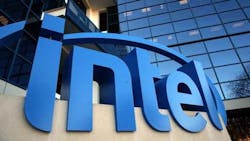Intel Licenses Technology from Rival ARM to Boost Foundry Business
Intel Corp. (IW 500/20), the world’s biggest semiconductor maker, said it’s licensing technology from rival ARM Holdings Plc, a move to win more customers for its business that manufactures chips for other companies.
The two chipmakers, whose designs and technology dominate in computing and mobile, unveiled the agreement on August 16 at the Intel Developer Forum in San Francisco. The accord will let Intel offer third-party semiconductor companies its most advanced 10-nanometer production lines for manufacturing the complex chips usually used in smartphones.
Intel, which gets the majority of its revenue from making personal-computer processors, has failed to gain ground in the larger and faster-growing phone market -- the stronghold of ARM’s technology. Under Chief Executive Officer Brian Krzanich, Intel is trying to persuade other chipmakers to use its factories for their production. Adding licenses for ARM’s technology could open up that business to fabricating chips based on those designs for companies such as Qualcomm Inc. and Apple Inc., which now have their chips produced by Taiwan Semiconductor Manufacturing Co. and others.
Intel’s embrace of the competing technology comes as the PC market continues to decline and growth in the lucrative server-chip market slows. The Santa Clara, California-based company began offering foundry services -- outsourced manufacturing -- under Krzanich’s predecessor, Paul Otellini, but hadn’t announced any major customers placing orders in large volume.
Indicating that those fortunes may be changing, Intel announced that LG Electronics Inc., South Korea’s second-biggest phone maker behind Samsung Electronics Co., will use Intel’s foundry business to manufacture 10 nanometer mobile-phone parts.
Separately, Intel said it won’t use extreme ultraviolet lithography as a manufacturing technique in its 10-nanometer production. The technology isn’t ready for the next generation of production, 7 nanometer, Intel also said, and the company won’t use the chipmaking technique until it delivers the promised efficiency.
ASML Holding NV is the main manufacturer of EUV machinery and has been trying to make it ready for full use for more than a decade. ASML’s stock fell as much as 3.5 percent in U.S. trading Tuesday following the comments by Mark Bohr, Intel’s head of process architecture.
“I can’t say whether it’s a year from now or three years from now,” Bohr said of the technique at the Intel conference. “I am hopeful.”
By Ian King
About the Author
Bloomberg
Licensed content from Bloomberg, copyright 2016.
